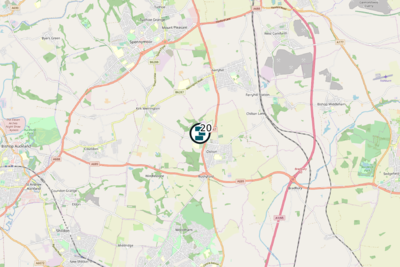Chilton Power Station: Difference between revisions
m tonnage data added |
add page specific text |
||
| Line 10: | Line 10: | ||
==Plant== | ==Plant== | ||
The facility cost £40 million to develop<ref name="ref1" />. | The facility cost £40 million to develop<ref name="ref1" />. It has a design capacity of 14 tonnes per hour with a maximum annual consumption of 120,000 tonnes. This is at a continuous rating of 312 tonnes per day based on an average [[CV]] of 15 MJ/kg. The anticipated availability of 7,800 to 8,000 hours per annum (89%)<ref>Annual Performance Report 2021</ref>. | ||
==Tonnage Input/Fuel== | ==Tonnage Input/Fuel== | ||
Revision as of 07:16, 27 May 2022
| Error: no local variable "site" has been set. Error: no local variable "status" has been set. | |
 See Biomass EfW → page for a larger UK Wide map. | |
| Operator | Error: no local variable "operator" has been set. |
| Capacity | Error: no local variable "capacity" has been set. MWe |
| Feedstock | Error: no local variable "mainfeed" has been set. |
| EPR (Waste Licence) | Error: no local variable "epr" has been set. |
| ROC | Error: no local variable "roc" has been set. |
| CfD | Error: no local variable "cfdcap" has been set. |
| CHP | Error: no local variable "chp" has been set. |
Operators Annual Report
Input Data
| Year | Wood | Litter | RDF | Other | Total |
|---|
Output Data
| Year | IBA | IBA %ge of Tot IN | APC | APC %ge of Tot IN |
|---|

Summary
A Biomass Waste EFW facility utilising a feedstock of up to 120,000 tpa of Wood Waste to generate 17.5 MWe to be exported to the national grid. The facility is located in the town of Chilton in Durham.
The facility has been developed, built and continues to be operated by Dalkia, a sister company to Veolia Environmental Services. Construction started in early 2010 and it became operational in 2011[2].
Plant
The facility cost £40 million to develop[2]. It has a design capacity of 14 tonnes per hour with a maximum annual consumption of 120,000 tonnes. This is at a continuous rating of 312 tonnes per day based on an average CV of 15 MJ/kg. The anticipated availability of 7,800 to 8,000 hours per annum (89%)[3].
Tonnage Input/Fuel
The tonnage received by the plant in the most recent Annual Sustainability Report for 2018-19[4] was reported by Ofgem as follows:
| Biomass | Tonnage (2018-19) |
|---|---|
| Wood Waste | 115,099 |
| Other | 0 |
| Total | 115,099 |
The Wood Waste is received from a variety of sources including old pallets, manufacturing off-cuts, wood from the construction and demolition industry and material from Waste Disposal Authority's civic amenity sites[2]. The Wood Waste tonnage received cannot be directly compared with the stated historical tonnage received and recorded in the EA statistics as these are recorded on a calendar year basis (i.e. January 2018 to December 2018) and was 117,162 tonnes.
References
- ↑ Robinson, P., 2011. Chilton Biomass Energy Centre County Durham. Online. Geograph.org.uk. [Accessed 7 April 2020.]
- ↑ 2.0 2.1 2.2 Lets Recycle, 2011. Dalkias 40M Biomass Plant Nears Completion - Letsrecycle.Com. Online. letsrecycle.com.[Accessed 6 April 2020.]
- ↑ Annual Performance Report 2021
- ↑ Biomass Sustainability Dataset 2018-19
